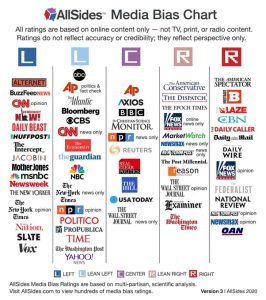A few days ago, Laura Hollis, a friend and former faculty colleague from my days as a professor and dean at the University of Illinois, contacted me. Today, Laura is a professor at Notre Dame University in South Bend, Indiana, where she teaches business law, among other subjects. She was writing a column about the media and asked if I would agree to be interviewed for it. Naturally, I said yes because if there is one thing that I spend a lot of time thinking and writing about, it is America’s news media and its precipitous decline. I am pleased to reprint Laura’s column, which appeared at https://townhall.com/
Can This Country Return to Old-School Journalism?
By
When I worked at the University of Illinois, I had the great fortune to befriend Ron Yates, who was then the dean of the College of Communications (later the College of Media).
Ron is an old-school journalist. He was educated and began his career at a time when the profession was known for serious (sometimes life-threatening) investigative work and a passion for finding the truth.

He received his degree in journalism from the University of Kansas, where he was editor of the award-winning student newspaper. In his senior year, he was invited to Chicago to interview with the Chicago Tribune, along with only two other college students from across the U.S. At the interview, Ron says, all three were asked what they wanted to be. One young man said, “I want to be a movie critic.” That man was Gene Siskel. The other said, “I want to be a columnist.” That was Clarence Page. Ron said, “I want to be a foreign correspondent.”
All three got their dream jobs.

In the many years Ron worked for the Tribune, he covered some of the most harrowing global events of the 20th century, including the Vietnam War and the fall of Saigon, the collapse of Cambodia to the communist Khmer Rouge regime, and the Tiananmen Square Massacre in China. He received numerous awards for his work and was nominated for the Pulitzer Prize three times, including in 1976, the year he lost to Sydney Schanberg from The New York Times, who won for his coverage of the fall of Phnom Penh. (Schanberg’s story was made famous by the Academy Award-winning film, “The Killing Fields,” in which his character was played by Sam Waterston. Oh, the stories Ron tells about that!)
I’ve been writing about the media’s role in massive propaganda campaigns for several years now. I decided to contact Ron after watching the most recent Orwellian media makeover: The press is now telling the public that new Democratic presidential nominee Kamala Harris was never really the “border czar,” despite President Joe Biden having bestowed those responsibilities upon her and despite that being the title the media themselves have used the past three years.
I wanted Ron’s take on the state of modern journalism in the United States. His assessment, as you might expect, was scathing.

He started by telling me about a recent Reuters poll that asked residents from 46 different countries about their trust in media. “Do you know where the United States came in?” he asked. “Dead last. Only 29% of Americans trust the media. Even post-communist countries like Romania and the Czech Republic are better!”
Americans don’t trust the press, Ron explained, because they know that media personalities are twisting facts to fit their preferred political narrative and suppressing information that doesn’t. “We’re being gaslit. For three and a half years, we all watched Biden decline, but we were being told, ‘He’s sharp as a tack.'”
Yates identified several causes of the problem: First, journalism schools are no longer teaching their students the craft. “When I was in school,” he explained, “what was pounded into our heads was to be as objective as possible. Subvert your own biases; if you don’t, you just become a propagandist.” He compared this with today’s journalism graduates, who “don’t think it’s their job to report the news; they think it’s their job to get people to make the ‘right’ choices.”
Second, Yates bemoaned the loss of the traditional newsroom. “Young journalists had mentors who helped them weed opinions out of news articles,” he said. “Accuracy was so important. If you continued to include your opinion or inaccuracies, you were fired.”
He also pointed out the current distorted balance of political viewpoints.
“In 1971, when I started,” Ron said, “26% of reporters identified as Republicans, 35% as Democrats, and the rest as ‘independents’ or unaffiliated. Today, 71% of reporters identify as Democrats, about 25% as independents or ‘moderates.’ Only 4% identify as Republicans or conservatives.” He attributes much of this shift to the leftward lurch of higher education. “Ninety percent of the faculty at a lot of universities are leftists, and this is just as true of journalism schools.”
Finally, Yates says, the organization responsible for monitoring the profession — the Society of Professional Journalists — isn’t doing its job. Ron directed me to the SPJ Code of Ethics page, which admonishes journalists to “seek truth and report it,” “be accurate and fair,” “label advocacy and commentary,” and hold “those with power accountable.”

“Today’s media doesn’t do any of that,” Yates stated. “The SPJ needs to hold their feet to the fire, and they’re not doing it.”
Ron was blunt about the challenges to Americans trying to get the facts.
“It’s not going to be easy,” he said. “We have information overload. Media outlets — from both political sides — are not dealing in truth, so the onus falls upon the consumer, who has to look at what the liberal outlets are saying and what the conservative outlets are saying and decide for themselves what the truth is. But most of the people you see on TV aren’t trained journalists; they just give their opinions. And the average American can’t tell the difference between opinion and journalism.”
Yates is encouraged by the proliferation of new media outlets like Substack and the Free Press, founded by former New York Times writer Bari Weiss; the increasing number of other journo expats like Uri Berliner, Glenn Greenwald, and Matt Taibbi, and Elon Musk’s purchase of X. “I hope that journalism in this country isn’t dead; that it’s only in a coma,” he said. “But it’s going to take a revolution in these newsrooms. Back to the old rules.”
Yates writes regularly at his blog site, ronaldyatesbooks.com/blog. If you’d like to know what real journalists think about today’s events, there’s no better place to start.
–30–
Laura Hollis is a nationally syndicated conservative columnist at the Creators Syndicate. She has more than 25 years of experience in law and politics, is a frequent public speaker, and has been a freelance political writer since 1993. In addition to writing articles for respected legal publications, she has also been a freelance political writer. She has taught law at the graduate and undergraduate levels and has nearly 15 years of experience in the development and delivery of entrepreneurship courses, seminars, and workshops for multiple audiences. Her scholarly interests include entrepreneurship and public policy, economic development, technology commercialization, and general business law.Tags: MEDIA
If you enjoyed this post, please consider subscribing to ForeignCorrespondent and tell your friends to subscribe. IT’S FREE! WHAT A DEAL! If you’ve received this from a friend and would like to be added to our distribution list for future blog posts, please enter your email address in the sign-up in the notifications box at:
https://ronaldyatesbooks.com/category/foreign-correspondent.
You can also find my commentaries on Substack at https://ronyates.substack.com/ and the American Free News Network at https://afnn.us.
Please feel free to comment. WE LOVE COMMENTS!

